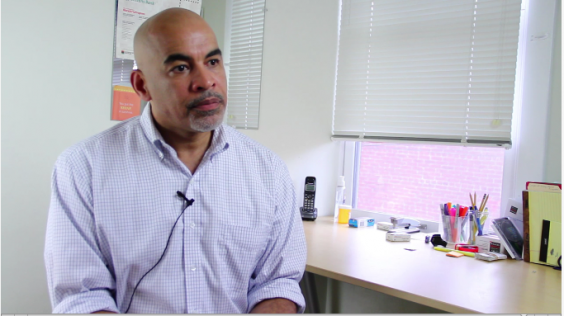The Writer’s Block Transcripts: A Q&A with Willie Perdomo
by Caitlyn Christensen / August 6, 2015 / No comments
On June 18, 2015, Willie Perdomo came to City of Asylum to participate in the fifth annual reading by Cave Canem poets. Cave Canem, an African American poetry organization, was founded by Toi Dericotte and Cornelius Eady in 1996.
Willie Perdomo is the author of The Essential Hits of Shorty Bon Bon, a finalist for the National Book Critics Circle Award in Poetry, and Smoking Lovely, winner of the PEN Beyond Margins Award, as well as Where a Nickel Costs a Dime, a finalist for the Poetry Society of America Norma Farber First Book Award. He has been the recipient of the Woolrich Fellowship in Creative Writing at Columbia University and a two-time fellowship with the New York Foundation for the Arts. Willie Perdomo read with Amber Flora Thomas and Cornelius Eady in the Alphabet City Tent on Sampsonia Way.
Before the reading, Willie talked briefly with Sampsonia Way about the influence of landscape on his work, the sacred space of poetry, and the voices that call to him as a writer.
How does landscape and location influence your writing process?
It’s interesting you ask. I miss walking in New York City. I live in New Hampshire now. I think the sense of relationship that I have to city blocks as a way of looking at the world, is something that I’ve missed. I think that the cityscape was so vital to my sense of imagery, the way I heard language, my relationship and negotiation of space. When you asked that question I think of Frederico García Lorca walking through Harlem heartbroken and how monstrous the cityscape looked. I’m always interested in how one interprets a landscape based on one’s unconsciousness or how one feels in a given moment. I’m always thinking about the city.
How have you seen the increase of racial tensions in the United States play out in your poetry community?
There’s always been a tradition of black poetry to do what they call speaking truth to power, or at least bearing witness and coming back with some testimony. It also seems to me, and I think maybe this is more personal than anything else, that we tend to use poetry to preserve our sense of dream, our dream space, even. There are some spaces that should be sacred. Even if we negotiate some sort of oppression, we still have to preserve some of that space so that we can get in touch with our silences, and be able to process those silences. If not process, at the very least mediate them.
Is writing a compulsion for you?
No. I think writing is like trying to walk on a rooftop ledge without falling sometimes. I think writing is a way of tapping into some sort of desire to re-imagine. It’s a way that I can communicate with ghosts. Especially this last time out for me, in terms of my last collection, it’s interesting the level of communication you can have with someone you’ve never met. It takes up a lot of narrative space, the legend of your family. That’s when writing takes on a whole different proposition for me.
What are some of your obsessions as a poet?
I can only speak from project to project. I think right now I’m vested in recalling the chosen family that I had with the friends I grew up with in East Harlem. They seem to be calling me now. There’s this one question that one of them keeps asking me. He keeps asking me, “Yo, when are you going to write that story about us?” And the game has started, I think. The level of trauma and stress that my generation has experienced is something that I’ve started to finally realize. It helps having someone on the other side asking you to tell them that story because you have a sense of your audience now.





